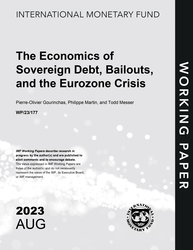
The Economics of Sovereign Debt, Bailouts, and the Eurozone Crisis
The Economics of Sovereign Debt, Bailouts, and the Eurozone Crisis
READ MORE...
Volume/Issue:
Volume 2023
Issue 177
Publication date: August 2023
ISBN: 9798400245503
$20.00
Add to Cart by clicking price of the language and format you'd like to purchase
Available Languages and Formats
| English |
Prices in red indicate formats that are not yet available but are forthcoming.
Topics covered in this book
This title contains information about the following subjects.
Click on a subject if you would like to see other titles with the same subjects.
Exports and Imports , Economics- Macroeconomics , Public Finance , Economics / General , Euro area , Monetary Union , Sovereign debt , bailouts , Eurozone crisis , bailout size , no-bailout clause , debt country , debtor country , Monetary unions , Loans , Collateral , Debt default , Global
Summary
Despite a formal ‘no-bailout clause,’ we estimate significant net present value transfers from the European Union to Cyprus, Greece, Ireland, Portugal, and Spain, ranging from roughly 0.5% (Ireland) to a whopping 43% (Greece) of 2010 output during the Eurozone crisis. We propose a model to analyze and understand bailouts in a monetary union, and the large observed differences across countries. We characterize bailout size and likelihood as a function of the economic fundamentals (economic activity, debt-to-gdp ratio, default costs). Our model embeds a ‘Southern view’ of the crisis (transfers did not help) and a ‘Northern view’ (transfers weaken fiscal discipline). While a stronger no-bailout commitment reduces risk-shifting, it may not be optimal from the perspective of the creditor country, even ex-ante, if it increases the risk of immediate insolvency for high debt countries. Hence, the model provides a potential justification for the often decried policy of ‘kicking the can down the road.’ Mapping the model to the estimated transfers, we find that the main purpose of the outsized Greek bailout was to prevent an exit from the eurozone and possible contagion. Bailouts to avoid sovereign default were comparatively modest.
Copyright © 2010 - 2026
Powered by:
AIDC



